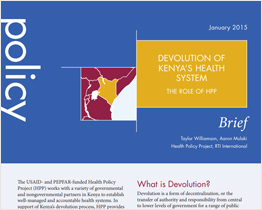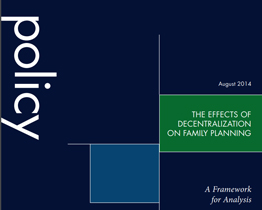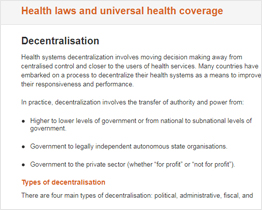Many low- and middle-income countries have decentralized financial and decision making responsibilities to lower levels of government as part of larger governance reforms. As part of this process, local governments may gain more responsibility for overseeing health service delivery and managing financial resources for health.
Decentralization of health functions (e.g., planning, budgeting, procurement, resource management, and service delivery for health) aims to improve efficiency and quality of health services and promote accountability. However, there is mixed evidence on the impact of decentralized financial and decision-making responsibilities for health systems on issues such as health service quality, efficiency, and equity, and on overall health outcomes such as reduced mortality and morbidity. These mixed results are mainly due to differences in the types of health functions that are decentralized, how decentralization is implemented, the capacity of local governments to take on the new roles, and the degree to which systems are in place for transparency and accountability within local government.
Under a fiscally decentralized system, local government may have revenue-raising capabilities and some autonomy over priority setting and resource allocation. This presents an opportunity for local government to raise and allocate more funds for health. In Kenya, devolution of budgetary authority to county governments, coupled with financial management and other types of capacity development for county governments, has resulted in increased health sector allocations. Within decentralized systems, national stewardship and financing approaches are still important. For example, national-level earmarked taxes for health and use of a needs-based formula to allocate resources to local governments may have encouraged local governments to allocate more funding to health in Chile and Colombia.
Why Is Fiscal Decentralization Important for FP?
Box 1. Family Planning and Decentralization: Two Country Examples
Rwanda: Modern contraceptive use in Rwanda increased from 3 percent in 2000 to 45 percent in 2010, partly due to a carefully planned, phased approach to fiscal decentralization, coupled with community-based health insurance and performance-based financing.
Mexico: Federal government decentralization of commodity procurement to states, including for contraceptives, resulted in states reallocating funds away from family planning and purchasers not benefiting from economies of scale. As a result, Mexico recentralized commodity purchasing through a federal pooled purchasing mechanism, which improved availability of family planning commodities.
Although family planning stakeholders are often excluded from discussions of decentralization, fiscal decentralization has important implications for family planning. In some countries, like Rwanda, fiscal decentralization has contributed to improvements in availability of family planning services (Box 1). However, fiscal decentralization can pose a risk to family planning financing if local governments do not prioritize family planning and reallocate resources to other areas.
In these cases, it is critical that local authorities understand the importance of funding family planning programs, including the positive impacts of family planning on health, economic, and social outcomes within their locality. This could be accomplished by engaging women and civil society organizations who can educate local decision makers and advocate for the local government to fund family planning services. Further, national governments must make strong commitments to family planning and take proactive measures to protect priority services such as family planning. Implementing national policies that regulate minimum service packages or funding levels, placing national government staff at decentralized levels to provide guidance, and retaining certain vertical programs and procurement functions – including family planning commodity procurement – at the central level may limit the ability of local governments to reduce funding for family planning.




